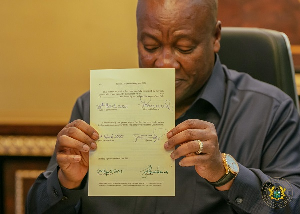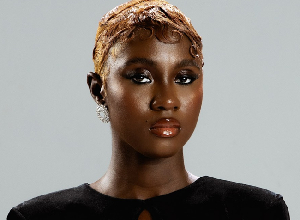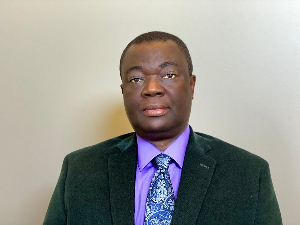?A trip to Ghana is not just a vacation; it is a balm for a broken soul?.- Retha Hill
The importance of tourism to the Ghanaian economy cannot be underestimated. Tourism remains the country?s major hope in the face of worsening terms of trade, debt trap and the unfair world economic order. It is currently the third highest foreign exchange earner and contributes 6.7% to GDP. Tourism receipts also constitute 10.4% of Ghana?s total export earnings. The tourism product which is also known as the invisible export is the most reliable export item because unlike the traditional and the so called non-traditional exports, prices are not determined by the buyers (tourists) and there is no quota in terms of the number of people who can visit Ghana. Also, the tourist product is not shipped physically to the consumers thereby eliminating cost to be incurred on freight and other handling charges. There are other benefits of tourism like environmental conservation and cultural preservation that cannot be quantified in monetary terms. Ghana?s tourism industry is experiencing an average annual growth of 20.5% and 41.3% in arrivals and receipts respectively, but should this be a cause for complacency ?, especially in view of the fact that the industry is becoming increasingly competitive. Ghana?s major tourism generating markets are U.S.A, U.K and Germany. However, a very important market segment that has not attracted the marketing effort that it deserves is the Afro-American tourist market.
The Afro-American tourist market constitutes an important niche market. At the moment, the U.S.A is Ghana?s second highest tourist generating market with the U.K being the first. In 2003, some 27,000 tourists arrived in Ghana from the Americas. Approximately 10,000 were African-Americans. Also, about a thousand are living and working in Accra. The African-American tourist market is Ghana?s niche market because it has the greatest growth potential in terms of arrivals and receipts. This is because the African-American tourist of today is more interested in exploring his/her cultural and historical heritage; the very products that Ghana offers. Also, they have a $300 billion spending power and spend 98% of their household income. The total income of this segment of the American population is the largest of all the ethnic groups at $485 and projected to reach $1.01 trillion by 2010. In a 2000 Gallup poll commissioned by the National Summit on Africa, 73% of African-Americans were interested in learning more about Africa.
When it comes to the African-American tourist market, Ghana has stronger selling points which should convince even the most laggard African-American.
? Ghana is a peaceful and stable country with hospitable and friendly people;
? Ghana has a mild weather with all-year-round sunshine and pristine beaches;
? Ghana has a shared relationship with Afro-Americans in the struggle for freedom from colonialism and for civil rights;
? Ghana has 32 of the 45 forts and castles built by Europeans on the west coast of Africa;
? Ghana is the birthplace of the Pan-African movement, the Nkrumah and W.E.B. Dubois factor and;
? Most African-Americans have traced their ancestry to West Africa in general and Ghana in particular.
In spite of these strong selling points and the potentials of the African-American market, there is no clearly defined marketing strategy for this market. Also, Ghana?s image among the African-American community can best be described as blurred and distorted. A number of African-Americans consider Africa as one country or worse still a language. After I had told a Black-American classmate that I came from Ghana in Africa, she demanded ?Do you know Ibrahim, my pen pal who lives in Durban?? This perception places enormous responsibility on Ghana as a destination trying to establish a unique identity.
African-Americans? perception of Africa has been informed by centuries of separation from the motherland as well as centuries of being fed with negative stories about Africa by the western media. The western media has always presented Africa as a jungle of atrocities, war, poverty and famine. This selective journalism has created the impression that nothing good could come out of Africa. This has no doubt affected tourism in-flows to African destinations since health and security concerns are important determinants of travel. As a result of constantly being fed with images such as a Tarzan in the jungle or a naked baby parading a war-ravaged country, a number of African-Americans have therefore taken this to be the real Africa. Eddie Murphy is said to have joked that ?Africans ride around butt-naked on a zebra?. Will Smith upon return from shooting a movie in Africa, remarked that ?I did not know Africa had beautiful women until I?d gone there?. This is because for centuries, the western media has symbolized the African woman only as one carrying a load on her head with her baby tied on her back with a wrinkled face and apparently malnourished; a victim of war, famine, poverty or AIDS. Most African-Americans are in the position of Will Smith and traveling to the motherland holds the key to unlocking their minds off these negative images. Some of these negative images about Africa and Ghana for that matter also affect tourist in-flows and should be corrected through marketing efforts. These images of Africa are invariably images of Ghana.
Ghana as a country also has problems with the African-American community. First, there is a grievance among a section of them to the effect that Ghanaians like other Africans collaborated the slave trade instead of resisting it. Perhaps the last straw that broke the camel?s back was the ?beautification? of the Cape Coast and Elmina castles in the early 1990s in the name of restoration and preservation. This was under the Historic Preservation Project which involved the stabilization and restoration of the three World Heritage monuments, Cape Coast Castle, Elmina Castle and Fort St. Jago. The Ghanaian authorities collaborated with the UNDP and USAID which are seen by some pan-Africanists as neo-colonialists and remnants of imperialism. This move has been described by some African-Americans as Disneyfication and desecration of shrines as well as acts of falsification and ?white washing? designed to mask the evils of slavery. It also received bad publicity in the western media especially History Today, New York Times, Washington Post and U.S. News and World Report.
To add insult to injury, a festival which was conceived to promote the ideals of pan-Africanism (PANAFEST) and could have easily been a drawing force for African-Americans to Ghana, has been marred by organizational problems and impotent marketing strategy since its inception in 1992. Due to this some people have termed it ?PANAFLOP? since it has mostly been a flop. As if that is not enough, other events to commemorate the end of slavery and the liberation movement such as Juneteenth and Emancipation Day have been introduced into Ghana but they have all been pale shadows of themselves. In fact they have sometimes conflicted with PANAFEST.
There is also talk of the Slave Route Project under the auspices of UNESCO but so far, the project has been restricted to conferences and the formation of committees. Instead of directing our resources towards enhancing the image of PANAFEST, the new Ministry of Tourism and Modernization of the Capital City, is planning of launching ?the Joseph Project? in 2007 to coincide with the 200th anniversary of the abolishing of the Transatlantic Slave Trade. The aim of ?the Joseph Project? is to encourage our brothers and sisters whose ancestors were forcibly uprooted from the African continent, to return to the homeland at least for a pilgrimage and to reconnect with their roots. The question is; how different is this from PANAFEST, Emancipation Day and the Slave Route? Also, how relevant is the name chosen for the project? A very important concept in marketing is branding. A brand name should be able to effectively communicate a product?s attributes but can Joseph communicate return to the motherland by African-Americans? The Joseph project appears to be a misnomer for such a project because the name ?joseph? does not occupy any place in the struggle against slavery in Ghana, the Diaspora or any part of Africa. While the philosophy behind the choice of ?Joseph? is understandable, there are several slaves who like Joseph, fought for the emancipation of their people and their names could have been used. Ottobah Cuguano, W.E.B Dubois, Marcus Garvey, and Harriet Tubman. What of Dr. Anthony William Amoo a slave who received European education and returned to Ghana before his death and has a monument in Fort St. Sebastian.
There is also talk of African-Americans feeling unwelcome to Ghana as well as allegations of mistreatment. They claim Ghanaians are intolerant to African-Americans and treat them as foreign tourists to be exploited though they are their own kith and kin. As one African-American lady Nehanda Imara, puts it ?we were not greeted at the airport with open arms, and are perceived as obronis?. Other factors that have contributed to this perception is the Citizenship Bill of 2001 with an additional provision which would have given African-Americans and Africans in the Diaspora ?the right of abode? which was only passed in 2002 by the NPP government. Even under this new bill, it takes seven years for them to apply and get the right of abode so as to be able to live and work in Ghana without having to resort to visa renewals.
African-Americans have also accused Ghanaians of denying them of government jobs, the right to vote as well as charging them higher hospital bills. In 2001,Wall Street Journal Reporter Pascal Zachary talked about his first-hand experience with the above claims in his article ?Tangled Roots for African-Americans in Ghana, the Grass isn?t Always Greener? . Though this received wide condemnation from the African-American Association of Ghana (AAAG) and numerous Ghanaians in the Diaspora, the damage that this article caused to the image of Ghana, cannot be underestimated. . Ghana also suffers an image problem in terms of a lack of uniformity in images projected through advertisement, public relations and other marketing activities by the Ghana Tourist Board, Ministry of Tourism, Tour Operators, hotels and other organizations. Over the years, themes like ?the real Africa?, ?the friendliest people in Africa?, ?the land of Gold? among others have been used in different media by different institutions and organizations to describe Ghana to the potential traveler. Most major tourism destinations have postcard images like the pyramids of Egypt, the Eiffel Tower of Paris, France, the statue of liberty of New York, the table mountain of South Africa, the Safari Parks of Kenya and the Taj Mahal of India. However, in the case of Ghana, there is no agreement as to what image to use so even for the African-American Market, at one time it is the Slave Castles, the Asantehene sitting in state or the Independence Arch. For Ghana to attract a substantial share of the African-American market, African-Americans must have strong mental images of the country. The best way to implant such images on their minds are to communicate a postcard image that will stand out of the noise and clutter on the market as well as a catchy theme.
Ghana has also tended to believe in the traditional marketing clich? that ?build it and they will come? without due cognizance for the fact that certain things draw tourists such as Afro-Americans to a destination. Ghana has not taken serious view of the fact that it has competing destinations; the tropical islands in the Caribbean and Southern American such as Jamaica, Barbados, Bahamas, Cayman Islands and Virgin Islands which the African-American tourist finds cheaper to travel to. In fact, one of these tropical Island destinations (Guyana) has always been confused with Ghana. Guyana seems to be on the mind of most African-Americans I have come into contact with, so that when I tell them I hail from Ghana, it is Guyana that they say after me and not Ghana. What of South Africa which is launching an aggressive marketing campaign? Senegal and its Goree Island, Gambia which has capitalized on Alex Haley?s ?roots? to stage Roots Festival in Banjul to compete against PANAFEST, Benin, which is also aggressively promoting its slave landmarks such as Ganvie (village on top of a river where the people sought solace from slave raiders) and of late Nigeria which is popularizing Slave Route Tourism in the slave port of Badagry?.
The Ministry of Tourism and its implementing agencies such as the Ghana Tourist Board should redirect their energies towards positioning Ghana on the minds of African-Americans so that Ghana will be their top-of-mind. To effectively carry out this, there is the need to understand the demographics, motivations, lifestyle, attitudes and interests of this market segment so as to know which advertising or public relations media will be the most appropriate to use and also to tailor our tourist product to suit their taste. For instance during the 1994 PANAFEST, a local concert party group were to perform to an African-American audience in blackface. Fortunately the program was called off due to technical problems. The question is how would the audience have reacted to a show that would have reminded them of the American Minstrel Shows which were used to mock the black race? A clear understanding of the African-American market would have averted such situations including the ?beautification? of the slave castles.
Among other things, African-Americans value self-image, style, elegance, family socialization and historical/cultural heritage. They also have tremendous brand loyalty, like watching T.V and reading African-American or community-based newspapers. These characteristics are very important in placing Ghana on their minds. T.V stations like BET and TV One, as well as Ebony Magazine, Black Issues and Blackmen should be used as the medium of advertisements and other forms of publicity aimed at attracting and maintaining the African-American tourist.
Ghana?s dwindling image among a section of the African-American community will also have to be repaired through PR activities. Fortunately, Ghana Expo 2004 will be held at the Georgia World Congress Center in Atlanta in September. and this could be an important forum for exposing the good things that Ghana could offer to the African-American community.
We should be able to establish Ghana as a Mecca for our African-American brothers and sisters who were unfortunately uprooted from Africa and transplanted on a strange land several centuries ago. This will invariably be a win-win situation for both Ghanaians and African-Americans as it will bring in much needed foreign exchange for Ghana?s development while helping to heal the souls of our estranged brothers and sisters. An annual pilgrimage to Ghana should be seen as a spiritual exercise and could be organized on the heels of an event like PANAFEST. However, PANAFEST needs to be organized in a more professional manner to effectively play such a role. Unnecessary duplication which only creates conflicts and wastage of resources like emancipation day and the proposed Joseph Project should be avoided.
Making Ghana attractive to the African-American market must involve the collaboration of all sectors of the tourism industry, all other industries and indeed all Ghanaians both home and abroad. A little hitch such as an unruly Taxi driver, dirty hotel linen or a harassing local resident can mar an entire tourist experience even if the tourist was having a nice time before the incident. The proverbial Ghanaian hospitality we pride ourselves with, should be manifested in all aspects of our dealings with tourists from the airport to the zoo. In the case of the African-American market, local residents need to be educated on how to deal with them. The?Goro? Boy at the airport who calls the Afro-American tourist ?obroni? as well as the beach boy at Elmina who pesters her for money all need to be educated.
The Ghanaian community in the U.S. has a greater role to play in marketing Ghana to their African-American friends and colleagues. Recommending Ghana to African-Americans as well as telling them the truth about the country and the slave trade will invariably convince some of them to visit the motherland. There is no exact figure as to the number of Ghanaians in the U.S., but if there are even one million of them and each year , a quarter of this figure is able to convince African-American friends to visit Ghana, that will be a far cry from the present 10, 000 of them who visit Ghana each year. However, for Ghanaians in America to effectively sell Ghana, they must be abreast with current issues in Ghana and also visit home themselves.
Finally, to effectively cater for this market too, there is the need for Ghana to improve, expand and update its tourism and hospitality receptive facilities and other ancillary services. Ghana according to the World Tourism Organization had 11,000 hotel rooms in 2002 as compared to 12,000 for Cote d?Ivoire, ???.. for Jamaica, and 51,900 For South Africa. This is a major challenge in our quest to host major events. For instance during the Africa African-American summit in 2001, there was a severe shortage in hotel rooms and some attendees had to put up with some Ghanaian families at the intervention of the GTB not to talk of those who were stranded. This is also a perennial problem with PANAFEST. The expansion of the Kotoka International Airport is highly commendable, however there is the need to improve and regularize flight schedules. For instance, during PANAFEST 2003, a number of people could not attend because of flight and visa acquisition problems.
If Ghana is to be a Mecca for the African-American, then there is the need for a proactive marketing strategy targeted at this market segment, public relational activities targeted at correcting the wrong perceptions about the country, collaboration and support from all facets of the Ghanaian society, improvement in tourism and hospitality facilities and education of the general populace.














